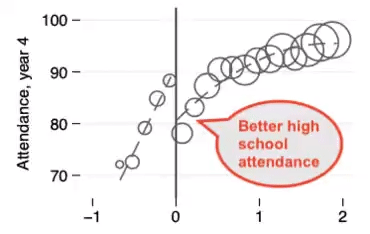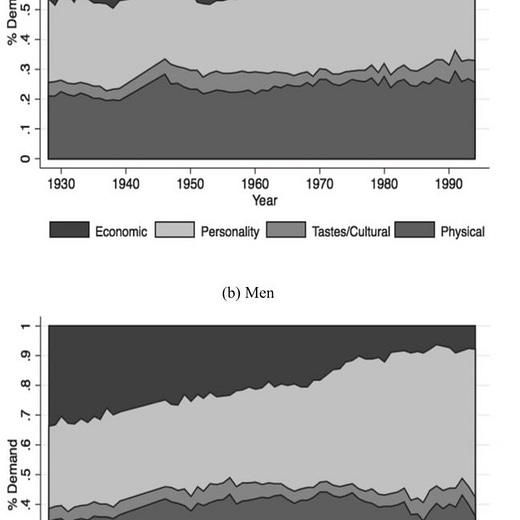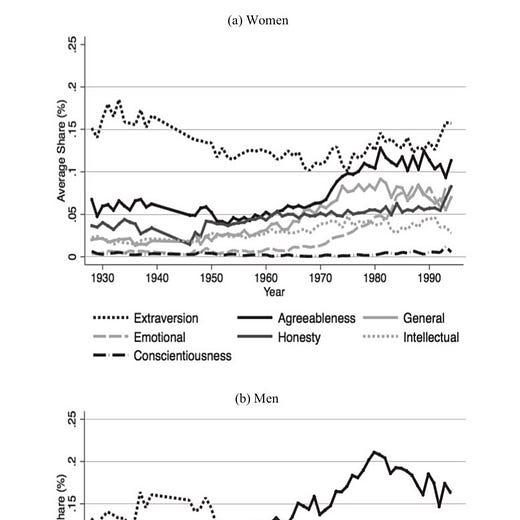Best of #econtwitter - Week of September 12, 2021
Sep 13, 2021
Welcome readers old and new to this week’s edition of Best of Econtwitter. Thanks to those sharing suggestions, over email or on Twitter @just_economics.
Paper summary threads

Nathaniel Hendren@nhendren82
My new working paper out today with @djh1202 shows how adverse selection has unraveled private markets for financial alternatives to student debt that would reduce the risk of investing in college.
scholar.harvard.edu/files/hendren/…
Thread summary below: (1/n)
scholar.harvard.edu
12:46 PM · Sep 6, 2021
104 Reposts · 459 Likes
^gif. More in “education-related gifs”:

Sade Bonilla@edpolicywonk
Our exploratory #RDD results show this course, using anti-racist curricula and pedagogy, sustained gains throughout HS in attendance and credits earned & additional evidence of an increase in college matriculation using @NSClearinghouse data

7:07 PM · Sep 7, 2021
4 Reposts · 22 Likes

Michael F. Pesko@mikepesko
We estimate continuous-treatment DD models to find that #ecig taxes reduce ecig use & raise #cigarette use.
Doubling existing #ecig taxes would reduce youth use by 12% but raise current #cigarette use by 8%, with particularly large increases for regular #cigarette users.
7/13
5:09 PM · Aug 31, 2021
9 Reposts · 19 Likes

Andy Garin@andy_garin
The data make clear that IC work has a distinct high-end and low-end. Here’s the distribution of work within earnings groups:
4/9

4:19 PM · Sep 6, 2021
4 Reposts · 10 Likes
^IC = independent contractors

Hans Henrik Sievertsen@hhsievertsen
Hi #Econtwitter!
happy to share a revised version of ⬇️ with @CmfValente & @Maheshcpuri
To recap:
>400 000 children die from blood infections every year 😢
- 2 RCTs: chlorhexidine can prevent this for 0.23USD/dose 👍
- 3 subsequent RCTs: no effect 😕
➡️slow/no roll-out
1/10

Hans Henrik Sievertsen @hhsievertsen
I am happy to share new work with @CmfValente and Mahesh Puri
Every year more than 400 000 children die from neonatal sepsis. Even though early RCTs of chlorhexidine cord care (CHX) suggest that this could be prevented for only US$0.23 per dose, adoption has been slow... https://t.co/iXclY1XqKy
4:14 PM · Sep 8, 2021
19 Reposts · 48 Likes

Lionel Page@page_eco
Fascinating evolution of stated preferences for a partner during the 20th century: personality criteria progressively replaced economic criteria.
Data from matrimonial ads in 🇫🇷.
ht @j_vechbany
cambridge.org/core/journals/…


1:06 PM · Sep 9, 2021
3 Reposts · 15 Likes
^trends in agreeableness?

Matt Clancy@mattsclancy
When the USSR collapsed, some subfields of non-Soviet mathematics got a surprise infusion of new ideas.
Agrawal, Goldfarb, and Teodoris show that as the burden of knowledge grew in these subfields, mathematicians specialized relatively more and formed bigger teams! 1/3

1:11 PM · Sep 9, 2021
18 Reposts · 100 Likes

Jonathan Heathcote@Jonheathcote
New/old paper with Hitoshi Tsujiyama now forthcoming. Paper tackles an old question – the shape of the optimal income tax schedule. Should marginal rates be flat (Friedman / Mirrlees), U-shaped in income (Diamond / Saez) or increasing (actual tax code)? 1/
journals.uchicago.edu

3:06 PM · Sep 9, 2021
23 Reposts · 141 Likes

Desmond Ang@ProfDesmondAng
How does police violence affect public cooperation w/ law enforcement? In a new WP w/ @PankaBencsik @jmb112485 @EDerenoncourt, we find large declines in crime-reporting after the murder of George Floyd. Across 8 cities, 911 calls per gunshot drop by 50% & total calls by 25%. 1/5

7:50 PM · Sep 9, 2021
161 Reposts · 454 Likes

Dave Holtz@daveholtz
🚨 New research just published in @NatureHumBehav: We analyzed the collaboration patterns of 61k+ @Microsoft employees to estimate the causal effects of firm-wide remote work (RW).
nature.com/articles/s4156…
1/
nature.com
The effects of remote work on collaboration among information workers - Nature Human Behaviour

4:10 PM · Sep 9, 2021
122 Reposts · 413 Likes

Claudio Ferraz@claudferraz
1/4 What happens when there are limits imposed on the amount of money that politicians can spend on their campaigns? In this paper forthcoming in @AEAjournals aeaweb.org/articles?id=10… we examine the effects on political entry, selection, and behavior of local politicians in Brasil
aeaweb.org
Money and Politics: The Effects of Campaign Spending Limits on Political Entry and Competition

10:08 PM · Sep 9, 2021
54 Reposts · 226 Likes
More: education-job loss association; Vietnamese development; decomposition of income gains; Korean development; broadband reduces poverty; fairness views
Public goods

ky@kylefbutts
🚨 Beamer Slides Template 🚨
My attempt at making beautiful beamer slides easy. h/t to @paulgp's beamer tips for a lot of inspiration.
pdf preview: raw.githubusercontent.com/kylebutts/temp…
source code: github.com/kylebutts/temp…
Details...

8:44 PM · Sep 7, 2021
106 Reposts · 744 Likes
Interesting discussions

John Cawley@cawley_john
As of 2021-09-05, the # of job openings on JOE for full-time academic jobs in the US is up 102.8% compared to same time in 2020 (!) and is even up 20.8% compared to this time in 2019 (which was pre-COVID). #EconTwitter #EconJobMarket 2/6

8:45 PM · Sep 10, 2021
28 Reposts · 76 Likes

Fatih Guvenen@fatihguvenen
Happy Labor Day!
Some food for thought about *lifetime* employment rate. A mini thread:
12.6% of US men work < 1/2 of prime-age years (25-55)
"Working" = Earnings > $2K in a year. A very low bar.
If "working" = $10K: 19.5% of men work <1/2
#econtwitter (1/n)

9:04 PM · Sep 6, 2021
12 Reposts · 62 Likes

Celeste Carruthers@ckcarruthers
Big news from Economics of Education Review - expedited, no-revision review track is now live and ready for submissions.

1:27 PM · Sep 10, 2021
50 Reposts · 209 Likes

Ben Golub@ben_golub
What are our best submissions to the scientific hall of fame of "we figured out how this real thing works"
Proposals:
(i) prices;
(ii) adverse selection e.g., why markets with private information don't work so well;
(iii) mixed Nash in penalty kicks
others?

CaltechEconTheory @CaltechEconThry
@ben_golub Econ is not math. It's part of the social sciences! In science there are (perhaps rarely) mysteries that are resolved, and then we (more or less) know. E.g., how tides work. Or what is beta radiation. Or the double helix structure of DNA. What are such examples in econ?
6:42 PM · Sep 6, 2021
3 Reposts · 66 Likes

